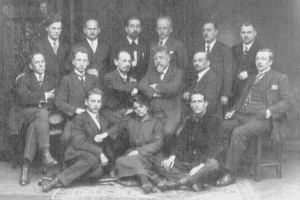
When the syndicalist international, IWMA (now IWA) held its foundation congress at the turn of the years 1922-1923, it was against a background of great upheavals. World War I had ended a few years earlier, a war which was immediately followed by widespread revolutionary movements in a number of countries, setting lasting trends in the development of the world.
During the war the social democratic international collapsed, and its affiliated parties threw their internationalism overboard. Under the leadership of especially their Belgian chairman Emilie Vandervelde, they gave active support to the war in the name of their respective countries. The reformist trade union international collapsed at about the same time.
After the end of the war, attempts began to re-build the international organizations. The Communist international was organized at a congress in Moscow i 1919, as a continuation of the so-called Zimmerwald international which has been etstablished already during the war. The trade union international was re-established the same year at a congress in Amsterdam. The social democratic international was formed in 1921 at a congress in Vienna, with the Austrian Friedrich Adler as its prime mover. This organization merged with the social democratic international in 1923.
On communist initiativ a congress in Moscow in 1921 founded the so-called Red trade union international. This organization made great efforts to get the syndicalists as members, but the syndicalist organizations refused, being unwilling to be involved in a union international led by a political movement, in this case the communists.
During the days 25.12.1922 to 02.01.1923 delegates from 10 countries representing about 2 million organized workers held a congress in Berlin.It was at this congress that the syndicalist international IWMA was founded.
The congress was certainly not able to work undisturbed. Care was needed because some of the delegates had to get there illegally, without the knowledge of the police. The first day of the congress was held in a building in the outskirts of Berlin. The plan was to continue the congress the next day at another place, but the police were on the trail so the delegates had to be given a secret message to meet at the third place, in Nieder-Schönweide, another area in Berlin. Work went on ok until during the afternoon, when a police patrol suddenly entered the building and wanted to see the delegates’ identity papers. The German comrades protested powerfully, and demanded that the police show documentation that they had orders for this action. They had no such orders, so the patrol withdrew, leaving two policemen behind to watch. The congress delegates then crowded out through the door into the street, pushed the policemen aside, and disappeared.
The congress met again the next day, this time near Alexanderplatz in the centre of Berlin, not far from the police headquarters.
In this building the congress proceeded without interruption for some days. But then one day before noon came a new police attack. The whole building was surrounded by policemen carrying rifles and with revolvers and grenades on their belts. They forced their way into the meeting room, where the delegates raised an uproar and protested powerfully. One delegate lacking proper papers jumped out of the window but was caught by the police outside. A Polish delegate lacking papers resisted the police but was knocked down. A French woman delegate then rushed foreward and hit the police officer in the face with her clenched fist. She was arrested and transported with some other comrades to the prison in Moabit. Every delegate was thoroughly searched. Among the delegates were Emil Manus who represented Denmark and Norway, and Edvind Lindstam and Frans Severin who represented the SAC. Two other SAC members were also present, not as delegates, but as individual members passing through Berlin on a journey to Paris. They were the later well-known authors Eyvind Johnsson and Viktor Vinde, the latter to later become editor of Stockholmstidningen.
After all this, the police left the meeting alone and the congress continued. It founded the International Working Men’s Association IWMA (*since 1974 the International Workers’ Association IWA). The Syndicalist International kept going during the Second World War, when the other internationals collapsed, and continues its activity today.
John Andersson
from ”Solidaritet” Aug-sept 1959
*Translator´s (of NSF-IWA) remarks on the new name IWA in parenthesis.
